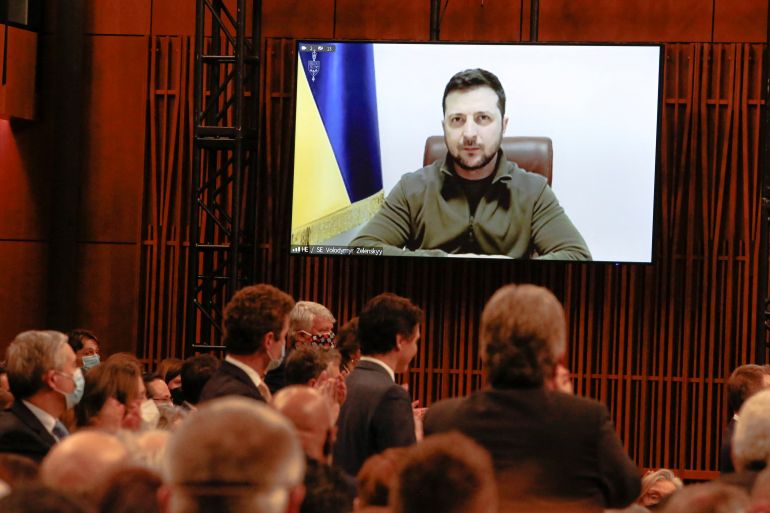Zelenskyy urges Ukraine no-fly zone in Canada parliament address
Ukrainian president gets multiple standing ovations in Canada’s parliament as he calls for more international support.

Ukraine needs a no-fly zone to stop Russian attacks on Ukrainian cities and towns, President Volodymyr Zelenskyy has told Canada’s parliament, as Western leaders continue to rule out directly intervening in the conflict.
Addressing the House of Commons in Ottawa virtually on Tuesday morning, Zelenskyy said Ukraine has experienced 20 days of “full-scale aggression” by Russia, which has killed at least 97 children so far.
Keep reading
list of 4 itemsHow is war destroying Ukraine’s cultural heritage?
Kyiv to impose 35-hour curfew amid fresh Russian attacks
UK blacklists 350 more Russians, imposes new import tariffs
“Can you imagine when you call your [allies], and you ask, ‘please close the sky, close the airspace, please stop the bombings, how many more cruise missiles have to fall on our cities until you make this happen?’ And in return, they express their deep concerns about the situation,” said Zelenskyy, who received multiple standing ovations from Canadian lawmakers.
“Please understand how important it is for us to close our airspace from Russian missiles and Russian aircraft. I hope you can understand.”
Zelenskyy has been pushing Ukraine’s Western allies, particularly the United States and the European Union, to do more to help the country stave off Russia’s all-out invasion, which began on February 24.
In recent weeks, the Ukrainian president has spoken to legislators in the European and British parliaments, and he is expected to deliver a virtual address to the US Congress on Wednesday.
He has called for more weapons and sanctions on Russia, as well as for NATO to impose a no-fly zone over Ukraine. But the transatlantic alliance, led by the US, has repeatedly rejected that proposition, saying a no-fly zone would risk a direct confrontation between Washington and Moscow.
In coordination with its allies, Canada has imposed several rounds of sanctions against Russian financial institutions and businesses, as well as on Russian oligarchs and government officials, including President Vladimir Putin and Foreign Minister Sergey Lavrov.
Earlier this month, Ottawa pledged additional military support to Ukraine, including thousands of rocket launchers and hand grenades, and unveiled new immigration schemes to allow Ukrainian refugees to come more easily to Canada.
The Canadian government also stripped Russia and Belarus of their status as “most favoured nation” trading partners on March 3, a move that imposed a 35-percent tariff on exports from both countries to Canada.
On Tuesday, Canada announced sanctions against 15 Russian officials it said have “enabled and supported President Putin’s choice to invade a peaceful and sovereign country”.
“With allies and partners, we’re imposing crippling sanctions to ensure Putin and his enablers in Russia and Belarus are held accountable. We have imposed severe sanctions on 15 new Russian officials, including government and military elites who are complicit in this illegal war,” Prime Minister Justin Trudeau said before Zelenskyy’s address.
Trudeau also praised the Ukrainian president, saying his “courage and the courage of your people inspires us all”.
“You’re defending the right of Ukrainians to choose their own future, and in doing so, you’re defending the values that form the pillars of all free, democratic countries,” Trudeau said in the House of Commons.
Zelenskyy is the third Ukrainian president to deliver a speech to Canada’s parliament, local news outlet CPAC reported, after Victor Yushchenko and Petro Poroshenko in 2008 and 2014, respectively.
“You’ve offered your help, your assistance, at our earliest request. You supply us with military assistance, with humanitarian assistance. You’ve imposed serious sanctions; at the same time, we see that unfortunately, this did not bring the war to an end,” Zelenskyy said on Tuesday morning.
“You can see that our cities like Kharkiv, Mariupol and many other cities, are not protected like your cities are protected – Edmonton, Vancouver. You can see that Kyiv is being shelled and bombed.
“You all need to do more to stop Russia, to protect Ukraine, and by doing that, to protect Europe from the Russian threat.”